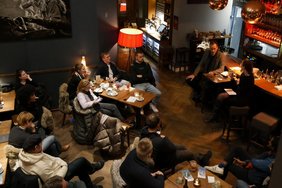The topic could not have been more relevant: the meeting of the Foreign Ministers of the participating states of the Organization for Security and Co-operation in Europe (OSCE) had just taken place in Skopje, North Macedonia, where the Russian Foreign Minister Lavrov had been eagerly awaited. Hence, there was plenty to talk about at the IFHS’s popular event series “HADLEY’S Evening Salon”, which this time focused on European security architecture and the work of the OSCE. Since Russia’s invasion of Ukraine two years ago, the Organization for Security and Co-operation in Europe, OSCE, has been in a deep crisis. Russia, as one of the 75 participating states, has blocked decisions for the past two years, for example on the budget. The OSCE cannot function without Russia because crucial decisions require approval of all participating states.
Dr Cornelius Friesendorf, expert in European Security Policy and head of the Centre for OSCE Research at the IFSH, gave insights into the work and impact of the organisation. According to the peace researcher, the OSCE is, alongside the United Nations, the last remaining international organisation in which Russia and Western states discuss security issues on a regular basis. Its broad mandate including human rights, environmental protection, promoting economic cooperation, arms control, and election monitoring, enables the OSCE to contribute to security in Europe in various ways. Its predecessor, the CSCE, which was founded 50 years ago with the signing of the Helsinki Final Act, contributed to the end of the Cold war, explained Friesendorf.
In the following discussion, the guest asked the expert about his view on the war in Ukraine. What factors led to the Russian aggression? Why could the war not be prevented by international organisations and how would a possible re-election of Donald Trump affect the course of the war?
The revisionist Russian foreign and security policy and the focus of the Ukraine supporters on deterrence and defence have led to an extremely unstable European security order. A peace order is not in sight. However, organisations like the OSCE should contribute to reducing risks such as unintended military escalation between Russia and NATO, according to Friesendorf.
The HADLEY'S Evening Salon is a well-attended IFSH event series. It takes place once a month at the bar HADLEY’S. Everyone who is interested can join. In a relaxed atmosphere, the IFSH researchers provide insights into current research topics. The meetings are held in German.
